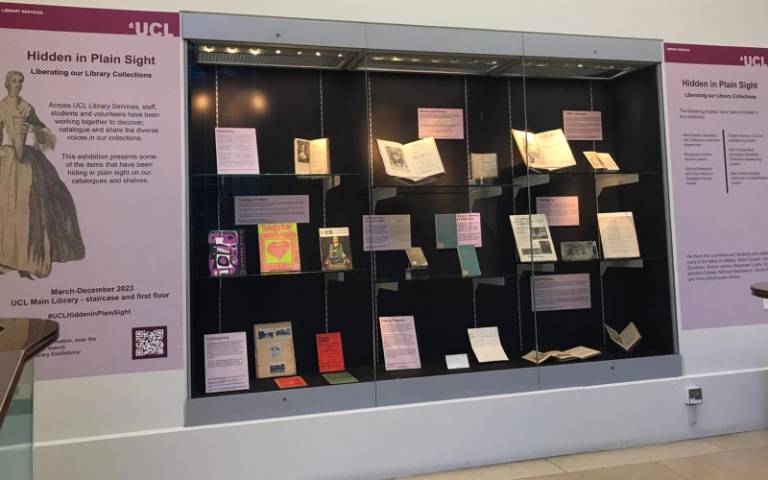UCL Library Services provides access to collections across a diverse range of subjects, dating from the 4th century AD to the present day, with significant holdings from the eighteenth century onwards

Having actively collected since UCL’s foundation in 1826, many of our collections represent the attitudes and ideas of their time. As a result, it is not uncommon to find harmful, discriminatory, or offensive terminology on Explore (our online library catalogue) and our archives catalogue.
Our collection strategies and policies give more information about what we collect and why, and how we are redressing the historical inequalities in UCL’s collecting.
To ensure wide access to our collections, we follow a variety of international and local cataloguing and classification standards, including descriptive metadata, subject headings, and classification schemes. Yet historical approaches to cataloguing remain prevalent in these standards and this can often hinder the increased accessibility we are trying to support. Standards are often products of western, especially anglophone, efforts and often reflect a typically 19th to mid-20th century worldview. This can include:
- An increased importance or focus on Europe and North America. Depending on the origin of a knowledge organisation scheme there may even be a particular emphasis on a specific region within this grouping, with different terminology found in schemes originating in the UK (such as UCL’s own cataloguing scheme, Garside) or the US Library of Congress Subject Headings (LCSH).
- The primacy of Christianity over other religions or organised religions over other beliefs.
- Embedded assumptions of gender roles.
- A tendency not to acknowledge a person’s sexuality.
We have been working to improve internal schemes and procedures to ensure we do not continue historical practices. Where we can, we are also adapting UCL’s application of external standards. This work is continuous, however it can be difficult to complete it comprehensively and quickly, and we are aware there is still much that can, and needs, to be done. You can find out about some recent work by watching the video from our 2023 exhibition Hidden in Plain Sight.
Library Collections
Cataloguing
Library cataloguing standards such as Resource Description and Access (RDA) generally use the titles and other information given on the item being catalogued, which may contain offensive terminology. Names of people are mostly taken from established lists, especially the U.S. Library of Congress’s Name Authority List, which could include incorrect or out of date information about preferred names and gender. It is sometimes possible to change these name headings.
Subject terminology is similarly based on standard lists of terms: Library of Congress Subject Headings (LCSH) and the U.S. National Library of Medicine’s Medical Subject Headings (MeSH). These can sometimes contain outdated or offensive terms or implications. As these are centrally controlled standards, it can be difficult and time consuming to change these internationally although UCL can in some cases amend subject terminology locally.
Classification
UCL uses a range of classification schemes all of which have been in use for many years and some of which show the biases inherent in their creation, especially towards a Christian, white, Western viewpoint. Most of these are local to UCL but a number are international standard schemes.
Local schemes require much more local maintenance but can be adapted more agilely. We are continually working to identify where we can make the most impact in this area locally within available resources, as the work can be time consuming.
Altering international schemes such as Library of Congress Classification (LCC) or Dewey Decimal Classification (DDC) is even harder and requires international standards bodies to be persuaded to make changes. A documentary, Change the Subject, tells the story of a group of students at Dartmouth College in New Hampshire who undertook to confront anti-immigrant sentiment in their library catalogue, including lobbying the United States Congress. The UK premier of the documentary was hosted at UCL in February 2020, and is now freely available on YouTube.
Archive Collections
Archive cataloguing does not conform to the same standards as library cataloguing, which provides Archivists with greater independence to adapt our ways of working. However, in the past it has been customary practice to use the language directly from the documents in modern catalogues, meaning our catalogues (both paper and online) contain terms and language that are now considered discriminatory or offensive. To update our catalogues with the modern-language equivalent would provide an inaccurate description of the contents of our holdings, misleading our users and leading to a failure on our part to acknowledge the subject matter. That is why, in some cases, you will see the contemporary language directly quoted in the catalogue. Such outdated terms should appear in quotation marks, and modern-language equivalent terms may be included alongside in square brackets. In such instances, or where the archive items but not the catalogue description contain offensive ideas and language, a content warning has been also added to the description. This work has started with our online archive catalogue, but we intend to address similar language in our Digital Collections soon. We are also addressing historical practices in our older paper handlists and card indexes as we convert them to online catalogues.
Content Warnings
Throughout our online resources you may see content warnings about catalogue descriptions and the contents of specific items or collections. Due to the extent of our holdings, we cannot apply such warnings to every item that may contain offensive language or terminology. Due to the historical nature of archives, such warnings are mainly found on our archives catalogue, and, in the future, on our Digital Collections. We are continuously reviewing and updating catalogue records, but if you see anything that needs addressing, please contact us at library@ucl.ac.uk.
 Close
Close

